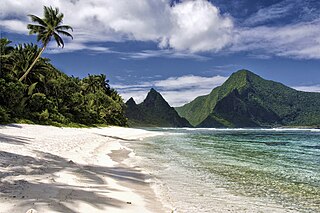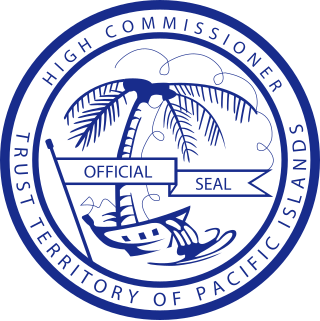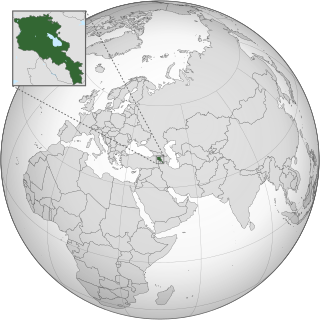
Jamaica has diplomatic relations with many nations and is a member of the United Nations and the Organization of American States. Jamaica chairs the Working Group on smaller Economies.

Palau, officially the Republic of Palau, is an island country in the Micronesia subregion of Oceania in the western Pacific. The republic consists of approximately 340 islands and connects the western chain of the Caroline Islands with parts of the Federated States of Micronesia. It has a total area of 466 square kilometers (180 sq mi), making it one of the smallest countries in the world. The most populous island is Koror, home to the country's most populous city of the same name. The capital Ngerulmud is located on the largest island of Babeldaob, in Melekeok State. Palau shares maritime boundaries with international waters to the north, the Federated States of Micronesia to the east, Indonesia to the south, and the Philippines to the northwest.

The economy of Palau consists primarily of subsistence agriculture and fishing. The government is the major employer of the work force, relying heavily on financial assistance from the United States. The population enjoys a per capita income of more than twice that of the Philippines and much of Micronesia. Long-term prospects for the tourist sector have been greatly bolstered by the expansion of air travel in the Pacific and the rising prosperity of leading East Asian countries.

In the law of the United States, an insular area is a U.S.-associated jurisdiction that is not part of a U.S. state or the District of Columbia. This includes fourteen U.S. territories administered under U.S. sovereignty, as well as three sovereign states each with a Compact of Free Association with the United States. The term also may be used to refer to the previous status of the Swan Islands, Hawaii, Puerto Rico, and the Philippines, as well as the Trust Territory of the Pacific Islands when it existed.

The Compacts of Free Association (COFA) are international agreements establishing and governing the relationships of free association between the United States and the three Pacific Island sovereign states of the Federated States of Micronesia (FSM), the Republic of the Marshall Islands (RMI), and the Republic of Palau. As a result, these countries are sometimes known as the Freely Associated States (FASs). All three agreements next expire in 2043.

The Single Convention on Narcotic Drugs, 1961 is a United Nations treaty that controls activities of specific narcotic drugs and lays down a system of regulations for their medical and scientific uses; it also establishes the International Narcotics Control Board.

The high commissioner of the Trust Territory of the Pacific Islands was an official who administered the Trust Territory of the Pacific Islands (TTPI), a United Nations trusteeship in the Pacific Ocean under the administration of the United States, between 1947 and 1994. The territory consisted of islands captured by America during World War II, prior to which they had been part of the Empire of Japan as the South Seas Mandate, within the Japanese colonial empire. After World War II, United Nations Security Council Resolution 21 placed the territory under the United States trusteeship as the Trust Territory of the Pacific Islands. The islands are now part of Palau, Northern Mariana Islands, Federated States of Micronesia, and Marshall Islands.
The Republic of Palau has had a turbulent history over the last 450 years, with many states claiming ownership over them. Since World War II, the Islands came under United Nations' trusteeship and were administered by the United States. After becoming a sovereign state in 1994, Palau joined the UN and ratified the Convention on the Rights of the Child in 1995, the Convention on the Rights of Persons with Disabilities and the optional protocol to the latter in 2013. In 2011, the International Covenant on Civil and Political Rights in 2011 and other core human rights treaties were signed. These treaties are yet to be ratified.

The recreational and medicinal use of cannabis in the Northern Mariana Islands has been legal since September 2018. House Bill 20-178 was signed into law by Gov. Ralph Torres, becoming Public Law 20-66. The cannabis legalization bill was introduced as the "Taulamwaar Sensible CNMI Cannabis Act of 2018," named in honor of David Kapileo Peter or Taulamwaar, who advocated cannabis legalization over four years ago. The first dispensary opened to the public on July 16, 2021.

Cannabis in Chile is illegal for all production and public consumption, though private at-home consumption, grow and selling is allowed for medical use. It is widely consumed, with the highest per-capita use in Latin America. In 2014 Chile began clinical trials on medical marijuana, and in 2015 a decriminalization bill successfully passed the lower house of the Chilean Congress.

Cannabis has been cultivated in Japan since the Jōmon period of Japanese prehistory approximately six to ten thousand years ago. As one of the earliest cultivated plants in Japan, cannabis hemp was an important source of plant fiber used to produce clothing, cordage, and items for Shinto rituals, among numerous other uses. Hemp remained ubiquitous for its fabric and as a foodstuff for much of Japanese history, before cotton emerged as the country's primary fiber crop amid industrialization during the Meiji period. Following the conclusion of the Second World War and subsequent occupation of Japan, a prohibition on cannabis possession and production was enacted with the passing of the Cannabis Control Law.
Cannabis in Grenada is illegal. Cannabis possession is the most common drug offense on the island, and the annual prevalence of cannabis use amongst adults was reported as 10.8% in 2005.
Cannabis in Georgia is legal in terms of its possession and consumption due to a ruling by the Constitutional Court of Georgia on 30 July 2018. This makes Georgia one of the first countries in the world to legalize cannabis for both recreational and medical use, and the only former-communist state in the world to do so.

Cannabis in Armenia is illegal for all uses.

Cannabis usage is currently prohibited in the United States military, but historically it has been used recreationally by some troops, and some cannabis-based medicines were used in the military as late as the twentieth century.
Cannabis in Ghana is illegal without license from the Minister of Health, but the nation is, along with Nigeria, among the top illicit cannabis-producing countries of West Africa. Cannabis in Ghana is known as weed or devil's tobacco.
During the administration of American President Jimmy Carter (1977–1981), the United States gave further consideration to the decriminalization of cannabis (marijuana), with the support of the president. However, law enforcement, conservative politicians, and grassroots parents' groups opposed this measure. The net result of the Carter administration was the continuation of the War on Drugs and restrictions on cannabis, while at the same time cannabis consumption in the United States reached historically high levels.
During the administration of American President Lyndon B. Johnson (1963–1969), the government made moves to reconsider cannabis law enforcement in the nation, including a more treatment-based approach to drug use. However, Johnson was saddled with controversies regarding the Vietnam War and internal national tensions, and was not able to make major changes to cannabis policy before declining to run for a second term in 1968. During the Johnson administration, cannabis usage was an issue of concern both in the youth counterculture as well as among American troops serving in the Vietnam War.
The Ministry of Finance is a government agency of Palau, responsible for public finances of Palau. The ministry is located in Ngerulmud. The vision of the ministry includes to promote productivity of government services, and economic growth. The ministry employs about 11 to 50 persons.











